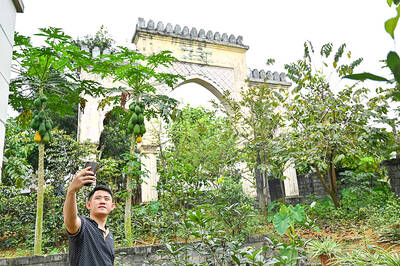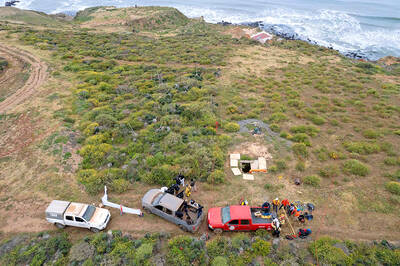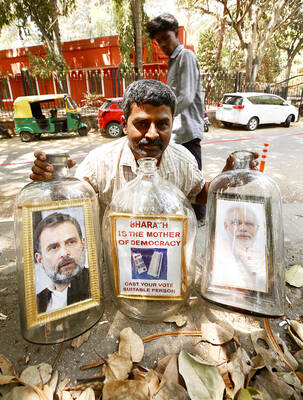People will have to be rationed to four modest portions of meat and one liter of milk a week if the world is to avoid runaway climate change, a major new report warns.
The report, by the Food Climate Research Network, based at the University of Surrey in England, also says total food consumption should be reduced, especially “low nutritional value” treats such as alcohol, sweets and chocolates.
It urges people to return to habits their mothers or grandmothers would have been familiar with: buying locally in-season products, cooking in bulk and in pots with lids or pressure cookers, avoiding waste and walking to the shops — alongside more modern tips such as using the microwave and Internet shopping.
The report goes much further than any previous advice after mounting concern about the impact of the livestock industry on greenhouse gases and rising food prices. It follows a four-year study of the impact of food on climate change and is thought to be the most thorough study of its kind.
Tara Garnett, the report’s author, warned that campaigns encouraging people to change their habits voluntarily were doomed to fail and urged the government to use caps on greenhouse gas emissions and carbon pricing to ensure changes were made.
“Food is important to us in a great many cultural and symbolic ways, and our food choices are affected by cost, time, habit and other influences,” the report says. “Study upon study has shown that awareness-raising campaigns alone are unlikely to work, particularly when it comes to more difficult changes.”
The report’s findings are in line with an investigation by this month’s Ecologist magazine, which found that arguments for people to go vegetarian or vegan to stop climate change and reduce pressure on rising food prices were exaggerated and would damage the developing world in particular, where many people depend on animals for food, other products such as leather and wool, and for manure and help in tilling fields to grow other crops.
Instead, it recommended cutting meat consumption by at least half and making sure animals were fed as much as possible on grass and food waste that could not be eaten by humans.
“The notion that cows and sheep are four-legged weapons of mass destruction has become something of a distraction from the real issues in both climate change and food production,” said Pat Thomas, the Ecologist’s editor.
The head of the UN intergovernmental panel on climate change, Rajendra Pachauri, also sparked global debate last month when he urged people to have at least one meat-free day a week.
The Food Climate Research Network found that measured by production, the UK food sector produces greenhouse gases equivalent to 33m tonnes of carbon. Measured by consumption — including imports — the total rises to 43.3m tonnes.
Both figures work out at less than one fifth of UK emissions, but they exclude the indirect impacts of actions such as clearing rainforest for cattle and crops, which other studies estimate would add up to 5 percent to 20 percent of global emissions.
The report found the meat and dairy sectors together accounted for just over half of those emissions; potatoes, fruit and vegetables for 15 percent; drinks and other products with sugar for another 15 percent; and bread, pastry and flour for 13 percent.
It also revealed which parts of the food chain were the most polluting. Although packaging has had a lot of media and political attention, it only ranked fifth in importance behind agriculture, manufacturing, transport, and cooking and refrigeration at home.
The report calls for meat and dairy consumption to be cut in developed countries so that global production remains stable as the population grows to an estimated 9 billion by 2050.
At the same time emissions from farms, transport, manufacturing and retail could be cut, with improvements including more efficient use of fertilizers, feed and energy, changed diets for livestock, and more renewable fuels — leading to a total reduction in emissions from the sector of 50 percent to 67 percent, it says.
The UN and other bodies recommend that developed countries should reduce total emissions by 80 percent by 2050.

With the midday sun blazing, an experimental orange and white F-16 fighter jet launched with a familiar roar that is a hallmark of US airpower, but the aerial combat that followed was unlike any other: This F-16 was controlled by artificial intelligence (AI), not a human pilot, and riding in the front seat was US Secretary of the Air Force Frank Kendall. AI marks one of the biggest advances in military aviation since the introduction of stealth in the early 1990s, and the US Air Force has aggressively leaned in. Even though the technology is not fully developed, the service is planning

Le Tuan Binh keeps his Moroccan soldier father’s tombstone at his village home north of Hanoi, a treasured reminder of a man whose community in Vietnam has been largely forgotten. Mzid Ben Ali, or “Mohammed” as Binh calls him, was one of tens of thousands of North Africans who served in the French army as it battled to maintain its colonial rule of Indochina. He fought for France against the Viet Minh independence movement in the 1950s, before leaving the military — as either a defector or a captive — and making a life for himself in Vietnam. “It’s very emotional for me,”

INTERNATIONAL PROBE: Australian and US authorities were helping coordinate the investigation of the case, which follows the 2015 murder of Australian surfers in Mexico Three bodies were found in Mexico’s Baja California state, the FBI said on Friday, days after two Australians and an American went missing during a surfing trip in an area hit by cartel violence. Authorities used a pulley system to hoist what appeared to be lifeless bodies covered in mud from a shaft on a cliff high above the Pacific. “We confirm there were three individuals found deceased in Santo Tomas, Baja California,” a statement from the FBI’s office in San Diego, California, said without providing the identities of the victims. Australian brothers Jake and Callum Robinson and their American friend Jack Carter

Indian Prime Minister Narendra Modi reaffirmed his pledge to replace India’s religion-based marriage and inheritance laws with a uniform civil code if he returns to office for a third term, a move that some minority groups have opposed. In an interview with the Times of India listing his agenda, Modi said his government would push for making the code a reality. “It is clear that separate laws for communities are detrimental to the health of society,” he said in the interview published yesterday. “We cannot be a nation where one community is progressing with the support of the Constitution while the other